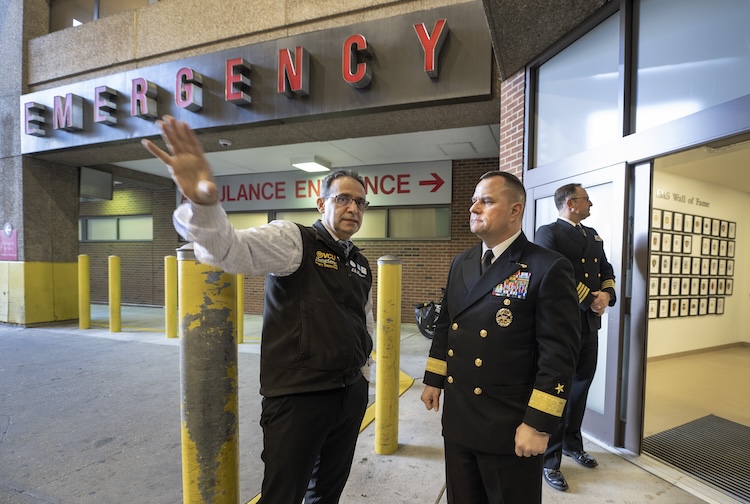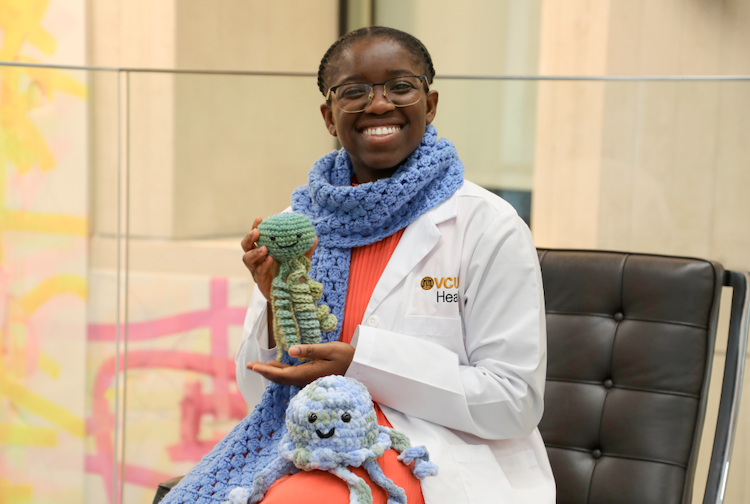
Pinwheels, pups are part of National Donate Life month at VCU Health Hume-Lee Transplant Center
April 03, 2017
Monday, April 3, 2017 The Rev. Stephanie Hamilton and a team of chaplains at VCU Health are trained to work in medical situations that present an option for organ donation. When she provides support to families facing end-of-life decisions, they are experiencing a range of emotions. “We’re with families as they are in shock and digesting devastating news regarding a loved one,” she said. In consultation with LifeNet Health, an organization that provides organ donation and tissue banking services, Hamilton is part of a delicate conversation with families regarding their options. If a deceased patient hasn’t made their wishes known, a family member can make the decision whether to donate their loved one’s organs. The conversations often are met with gratitude and mindfulness. “Families find great meaning that something good can come out of something traumatic,” Hamilton said. “Sometimes they say, ‘Oh, yes. My son can live on in another way.’ It’s very powerful. It acts as grief support.” Donate Life America established National Donate Life Month in an effort to spearhead local, regional and national activities that encourage Americans to register as organ donors. “The activities and information sharing we’ve made available this month are an effort to continually promote organ donation in a way that answers questions and piques interest and action,” said Marlon Levy, M.D., director of VCU Health Hume-Lee Transplant Center. According to Donate Life America, more than 120,000 men, women and children await lifesaving organ transplants. One deceased donor can save up to eight lives through organ donation and heal over 50 through eye and tissue donation. Still, living organ donation comes with several particular benefits to the recipients, and Hume-Lee is encouraging people to consider them. For example, a living donor’s organs can last twice as long as a deceased donor’s organs and transplant surgery can be scheduled earlier allowing for faster recovery and better outcomes. Currently at Hume-Lee, approximately 90 patients are awaiting a liver and 429 patients are awaiting a kidney. “Having readily available the organs needed to perform transplants means fewer people added to the national waiting list,” Levy said. In April 2016, a National Donate Life flag was first raised outside VCU Medical Center. Typically, the flag is raised whenever an organ donation occurs at VCU Health and Hume-Lee from a living or deceased donor. However, throughout April it remains at full staff. Another visual reminder of the month around VCU Medical Center is a pinwheel display in the hospital’s main lobby. Each pinwheel has four sails supported by one stem, symbolizing the power one person has to be an organ, eye, tissue or living donor. The pinwheels also bear the names of recent donors. It’s careful reminders like these that will make the difference, Hamilton said. “When you put things before people it puts it in their consciousness. Most of us need to hear something over and over again,” she said. “Most people don't like to stop and think about it, but if we can normalize it that helps. We need to take the time to make our wishes known regarding end-of-life donation. It can be an incredible legacy.” For more information about organ transplantation, visit vcuhealth.org/transplant. To learn more about organ donation and to register as a donor, visit donatelifevirginia.org. Virginia Commonwealth University is a major, urban public research university with national and international rankings in sponsored research. Located in downtown Richmond, VCU enrolls more than 31,000 students in 225 degree and certificate programs in the arts, sciences and humanities. Seventy-nine of the programs are unique in Virginia, many of them crossing the disciplines of VCU’s 13 schools and one college. The VCU Health brand represents the health sciences schools of VCU, the VCU Massey Cancer Center and the VCU Health System, which comprises VCU Medical Center (the only academic medical center and Level I trauma center in the region), Community Memorial Hospital, Children’s Hospital of Richmond at VCU, MCV Physicians and Virginia Premier Health Plan. For more, please visit www.vcu.edu and vcuhealth.org.
About VCU and VCU Health



